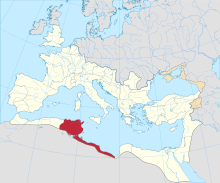Henchir-Aïn-Dourat, also known as Ad-Duwayrat or Henchir Durat, is a former Roman–Berber civitas and archaeological site in Tunisia. It is located at 36.767496n, 9.524142e, in the hills just north of Toukabeur and 15.3 km (9.5 mi) from Majāz al Bāb. It was an ancient Catholic diocese.

History
editThe ruins have been identified as the remains of Uccula a municipium of the province of Africa Proconsularis during the Roman Empire,[1][2] and which was active from 330 BC – AD 640. The ruins at Henchir-Aïn-Dourat have been surveyed,[3] and include a statue of mars.[4] An inscription in the ruins honors Constantine as "beyond the other emperors" and "unconquered".[5] and another earlier in its history honours Divus Titus.[6]
Before the Romans the town [7] was in the tribal area of the Afri, a Berber confederation.
The civitas was also the seat of an ancient Christian bishopric, which survives today as a titular see of the Roman Catholic Church.[8][9]
References
edit- ^ Titular Episcopal See of Uccula .
- ^ Barrington Atlas, 2000, pl. 32 E3
- ^ René Cagnat & Salomon Reinach, Découvertes de villes nouvelles en Tunisie Comptes rendus des séances de l'Académie des Inscriptions et Belles-Lettres (1885) Vol.29, Num,3 pp. 252-260.
- ^ Abdellatif Mrabet, In Africa and in Hispania (Edicions Universitat Barcelona, 2007 ) p176.
- ^ Raymond Van Dam, Remembering Constantine at the Milvian Bridge (Cambridge University Press, 29 April 2011) p171.
- ^ Duncan Fishwick, The Imperial Cult in the Latin West (BRILL, 2002) p199.
- ^ Mark Vessey, A Companion to Augustine (John Wiley & Sons, 21 May 2012 ) p24.
- ^ "Apostolische Nachfolge – Titularsitze". Archived from the original on 2018-10-05. Retrieved 2017-02-14.
- ^ Uccula at 'gcatholic.org